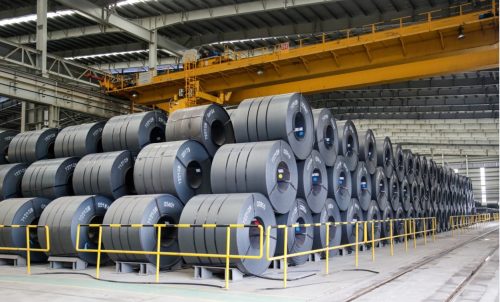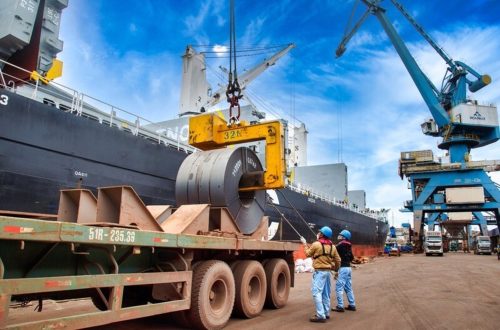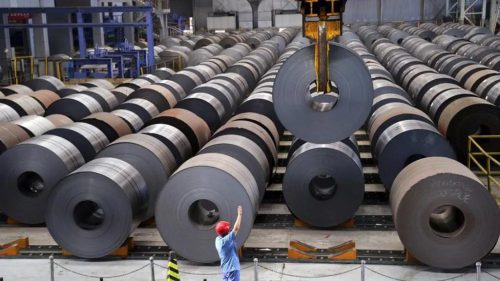If you’ve delved into the steel manufacturing process used in constructing buildings, manufacturing vehicles, and various products we use daily, the concept of hot-rolled steel coil might already be familiar. However, to gain a deeper understanding, let’s pose the question: What is a hot-rolled steel coil, and why does it play a crucial role in modern steel production?
Let’s explore further the fundamental knowledge about hot-rolled steel coils and the benefits they bring to businesses in various fields through the content below.
Hot-rolled steel coil is a type of steel produced through a high-temperature rolling process, often exceeding 1000 degrees Celsius. During this process, the steel billet can change properties, size, and shape to create steel products according to specific requirements.
Hot-rolled steel coils often feature a characteristic blackish-blue surface with an oily sheen. The thickness of these coils usually ranges from 1mm and above. The edges of hot-rolled steel coils are processed to remove sharpness, providing a neat appearance.
Hot-rolled coils are used to produce HRC steel. The hot-rolling process involves heating the steel at high temperatures and then passing it through rollers to achieve the desired shape and thickness.

HRC comes in various types, including commercial quality (CQ), structural quality (SQ), and drawing quality (DQ). The most common type is CQ, typically used for general-purpose applications such as pipes, tubing, and automotive parts. Grades SQ and DQ are often used for manufacturing applications like beams, plates, and other structures requiring higher strength.
There are several benefits to using HRC over other steel products. HRC has higher yield strength compared to other steel types, making it ideal for high-stress applications. It also exhibits excellent abrasion resistance, making it suitable for environments with high abrasion. Additionally, HRC possesses good welding and shaping properties, making it easy to fabricate into parts and components.
SEE MORE: HOT-ROLLED STEEL PRICING
There are three main types of hot-rolled steel coils:
Hot-rolled steel coils find extensive use in the construction and manufacturing industries. It serves as a basic raw material used to produce various products, including steel pipes, wires, and sheets.

Hot-rolled steel coils are produced from the basic oxygen furnace (BOF) steelmaking process or from blast furnaces and direct reduced iron (DRI) routes. The advantages of hot-rolled coils include low cost, wide availability, and consistent quality. Additionally, hot-rolled steel coils have good welding and shaping capabilities.
See more: Differentiating hot-rolled steel and cold-rolled steel
Hot-rolled steel coils are commonly used in construction and manufacturing. The primary difference between hot-rolled and cold-rolled coils lies in the fact that hot-rolled coils are manufactured at higher temperatures, making them easier to work with. Hot-rolled coils also tolerate higher imperfections and are less prone to warping or cracking during fabrication.
When choosing a hot-rolled coil for your project, it’s essential to consider the material you’ll use it for. Hot-rolled steel coils come in various grades, each with different characteristics and applications. For instance, lower grades like commercial quality or drawing quality might be more suitable for projects not requiring high strength or durability, such as light metal sheet fabrication. Higher grades like structural quality or pressure vessel quality are often used in heavier applications like welding or structural construction.

It’s crucial to also consider the size and shape of the hot-rolled steel coil you need for your project. Hot-rolled coils come in different widths and thicknesses, so choosing the right type is essential for the current task.
For example, thinner coils might be more suitable for applications requiring high precision, such as in the automotive industry. Heavier coils might be more suitable for projects where strength and durability are crucial, such as in construction projects.
Lastly, you should also consider the cost of hot-rolled steel coils when making a decision. Hot-rolled steel coils generally have lower costs compared to cold-rolled coils. They are versatile and cost-effective steel products that can be used in multiple applications. The hot-rolling process offers many benefits, including increased strength, improved ductility, and reduced cracking.
Understanding the basics and benefits of hot-rolled coils will help you make informed decisions about which type of steel to use for your next project. With its numerous advantages, hot-rolled steel coils are an excellent choice for any application requiring reliable results at an affordable price.
See more: What is hot-rolled steel plate?
Similar to the prices of other materials in the steel industry, manufacturers set hot-rolled steel coil prices based on various factors. Hot-rolled steel coils are manufactured under strict quality control using advanced techniques and equipment. The price of hot-rolled steel coils varies significantly based on width, thickness, weight, steel type, and intended use. According to market surveys in Vietnam, the price range for hot-rolled steel coils fluctuates between 11,500 VND to 12,000 VND per kilogram.
Keeping updated with market information is crucial for business operations. These details also influence the prices of hot-rolled steel coils. Several online charts display today’s HRC prices, so it’s important not to confuse hot-rolled coils with cold-rolled coils, which are essentially made from hot-rolled coils.
To acquire quality hot-rolled steel coil products at a suitable cost, you can reach out to Stavian Industrial Metal Joint Stock Company. They are a modern integrated manufacturing enterprise, combining hot-rolled steel coil production, stainless steel coil, stainless steel sheet, stainless steel pipes, cold-rolled steel, galvanized steel, Galvalume steel, and color-coated steel, sales, and after-sales services. Stavian has the capability to provide comprehensive steel solutions with supply and services.
For inquiries, please contact:
Address
Website: https://stavianmetal.com
Email: info@stavianmetal.com
